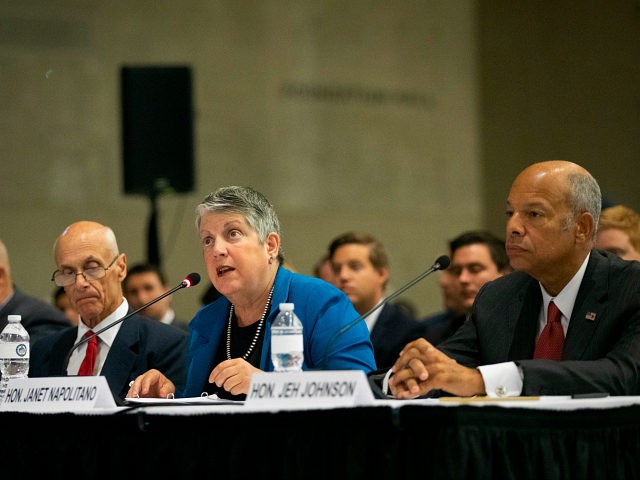No mention of radical Islam was made by any senators during Monday’s Senate Homeland Security Committee hearing — uniquely held at the National 9/11 Memorial & Museum in New York City, NY — days before the 18th anniversary of the Islamic terrorist attacks of September 11, 2001.
Post-9/11 domestic instances of Islamic terrorism were also ignored, including but not limited to the attacks in Chattanooga, Fort Hood, Orlando, and San Bernardino. The only references to ideological dimensions of Islamic terrorism were made by former Secretary of Homeland Security Michael Chertoff, who referred to “jihadi terrorists” in three instances.
Chertoff was joined by Janet Napolitano and Jeh Johnson, two former directors of the Department of Homeland Security in testifying before the committee, professedly on matters of national security.
“Climate change poses an existential threat” to America and Earth, declared Sen. Gary Peters (D-MI), ranking member of the Senate Homeland Security and Governmental Affairs Committee. He linked “climate change” to 9/11 in his opening remarks, calling on DHS to prioritize halting the ostensible phenomenon:
Climate change poses and existential threat not only to the United States but our entire planet. The Department of Homeland Security is our first line of defense against these and other challenges. As these threats to our homeland change, so must the efforts to protect our national security. With nearly two decades of lessons learned, the time has come for a clear-eyed assessment of what has worked and what needs to be improved. As we reflect on what the department has accomplished to date, we must consider whether the size and capacity of DHS can keep pace with the constantly evolving threats. In order to build a more sustainable department and defend ourselves from global threats, we must look to the future. It is not enough to understand the effect of the moment. We must also make sure DHS is prepared to anticipate those threats arising in out future. This is a difficult conversation, but one we must have to ensure we never again face a catastrophic event like September 11.
Peters also singled out “white supremacist violence” as a national security threat, with Chertoff similarly warning of “white supremacists.” “A rise in violence driven by racism, religious discrimination, and other hateful ideologies has altered our perception of domestic terrorism,” said Peters.
Napolitano similarly framed “climate change” and “global warming” as national security threats to be prioritized by federal government policy, linking the two to illegal immigration and “radicalization”:
It is also time for Congress and DHS to recognize climate change as a generational threat to the homeland that must be addressed in a meaningful way. The uptick is extreme weather events on land and offshore clearly impact the missions of FEMA and the U.S. Coast Guard, from rescue and reconnaissance to disaster preparation, response, and recovery, our changing climate requires DHS to approach those missions differently. Climate evolution also implicates our border and immigration system, thereby directly affecting USCIS, CBP, and ICE. Extreme weather is destroying crop yields in Central and South America, devastating economies, and driving out jobs and gainful employment opportunities. Wth lost jobs and lost wages, the aperture towards radicalization widens, as does the draw of northward migration. There are many factors that lead to migration to the United States, but the downstream effects of climate change are certainly among them. If we as a nation fail to address climate change in a holistic and global way as a threat to the homeland, we will ignore one of the nation’s — and the world’s — greatest security risk.
“The U.S. border with Mexico,” stated Napolitano, is not “a threat to the homeland.” She added, “What we do not need and what does not make sense is a wall from one end of the border to the other.”
Napolitano concluded, “Show me a ten-foot wall, and I will show you an 11-foot ladder. … The debate about a costly and needless border wall should come to an end. It distracts us from the overall mission of DHS. It is a red herring. I urge this committee to consider putting an end to discussions on a border wall.”
“Gun safety, gun safety, and gun safety,” said Johnson, listing his top three national security priorities. He maintained the Obama administration’s refusal to use the term “Islamic terrorism,” instead referring to “violent extremism.”
“I support anything — consistent with the Second Amendment — that has bipartisan support, [and] that makes it more difficult for a deranged violent person to get his hands on a gun, specifically an assault weapon,” added Johnson.
Napolitano concurred, “I think that universal background checks is a good step towards greater security for the country, but it is a first step.”
Follow Robert Kraychik on Twitter @rkraychik.

COMMENTS
Please let us know if you're having issues with commenting.